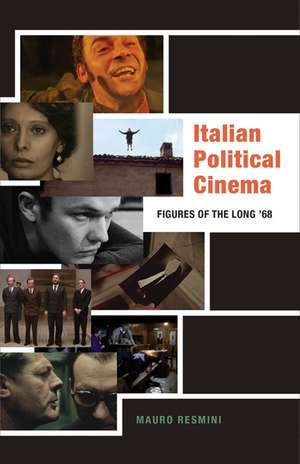Italian Political Cinema: Figures of the Long ’68
Autor Mauro Resminien Limba Engleză Paperback – 3 ian 2023
An exploration of how film has made legible the Italian long ’68 as a moment of crisis and transition
Traditionally, the definition of political cinema assumes a relationship between cinema and politics. In contrast to this view, author Mauro Resmini sees this relationship as an impasse. To illustrate this theory, Resmini turns to Italian cinema to explore how films have reinvented the link between popular art and radical politics in Italy from 1968 to the early 1980s, a period of intense political and cultural struggles also known as the long ’68.
Italian Political Cinema conjures a multifaceted, complex portrayal of Italian society. Centered on emblematic figures in Italian cinema, it maps the currents of antagonism and repression that defined this period in the country’s history. Resmini explores how film imagined the possibilities, obstacles, and pitfalls that characterized the Italian long ’68 as a moment of crisis and transition. From workerism to autonomist Marxism to feminism, this book further expands the debate on political cinema with a critical interpretation of influential texts, some of which are currently only available in Italian.
A comprehensive and novel redefinition of political film, Italian Political Cinema introduces its audience to lesser-known directors alongside greats such as Pasolini, Bertolucci, Antonioni, and Bellocchio. Resmini offers access to untranslated work in Italian philosophy, political theory, and film theory, and forcefully advocates for the continued artistic and political relevance of these films in our time.
Traditionally, the definition of political cinema assumes a relationship between cinema and politics. In contrast to this view, author Mauro Resmini sees this relationship as an impasse. To illustrate this theory, Resmini turns to Italian cinema to explore how films have reinvented the link between popular art and radical politics in Italy from 1968 to the early 1980s, a period of intense political and cultural struggles also known as the long ’68.
Italian Political Cinema conjures a multifaceted, complex portrayal of Italian society. Centered on emblematic figures in Italian cinema, it maps the currents of antagonism and repression that defined this period in the country’s history. Resmini explores how film imagined the possibilities, obstacles, and pitfalls that characterized the Italian long ’68 as a moment of crisis and transition. From workerism to autonomist Marxism to feminism, this book further expands the debate on political cinema with a critical interpretation of influential texts, some of which are currently only available in Italian.
A comprehensive and novel redefinition of political film, Italian Political Cinema introduces its audience to lesser-known directors alongside greats such as Pasolini, Bertolucci, Antonioni, and Bellocchio. Resmini offers access to untranslated work in Italian philosophy, political theory, and film theory, and forcefully advocates for the continued artistic and political relevance of these films in our time.
Preț: 186.44 lei
Nou
Puncte Express: 280
Preț estimativ în valută:
35.68€ • 37.11$ • 29.46£
35.68€ • 37.11$ • 29.46£
Carte disponibilă
Livrare economică 24 martie-07 aprilie
Livrare express 07-13 martie pentru 27.53 lei
Preluare comenzi: 021 569.72.76
Specificații
ISBN-13: 9781517911386
ISBN-10: 1517911389
Pagini: 320
Ilustrații: 54 b&w illustrations
Dimensiuni: 140 x 216 x 23 mm
Greutate: 0.43 kg
Editura: University of Minnesota Press
Colecția Univ Of Minnesota Press
ISBN-10: 1517911389
Pagini: 320
Ilustrații: 54 b&w illustrations
Dimensiuni: 140 x 216 x 23 mm
Greutate: 0.43 kg
Editura: University of Minnesota Press
Colecția Univ Of Minnesota Press
Notă biografică
Mauro Resmini is associate professor of cinema and media studies and Italian at the University of Maryland, College Park.
Recenzii
"Mauro Resmini’s Italian Political Cinema is a powerful and original reimagining of the question of the political in Italian cinema. Bracingly theorized and enriched by a fine handling of form and historical context, Resmini’s book heralds a new era in Italian film studies while making an important contribution to the theorization of cinema’s political possibilities."—John David Rhodes, author of Spectacle of Property: The House in American Film
"By being courageous enough to embrace unresolved tensions, Resmini constructs one of the most exciting explorations of political cinema to date, one sure to have encouraging effects for film analysis, political struggle, and knowledge production at large."—Film Quarterly
"By being courageous enough to embrace unresolved tensions, Resmini constructs one of the most exciting explorations of political cinema to date, one sure to have encouraging effects for film analysis, political struggle, and knowledge production at large."—Film Quarterly
